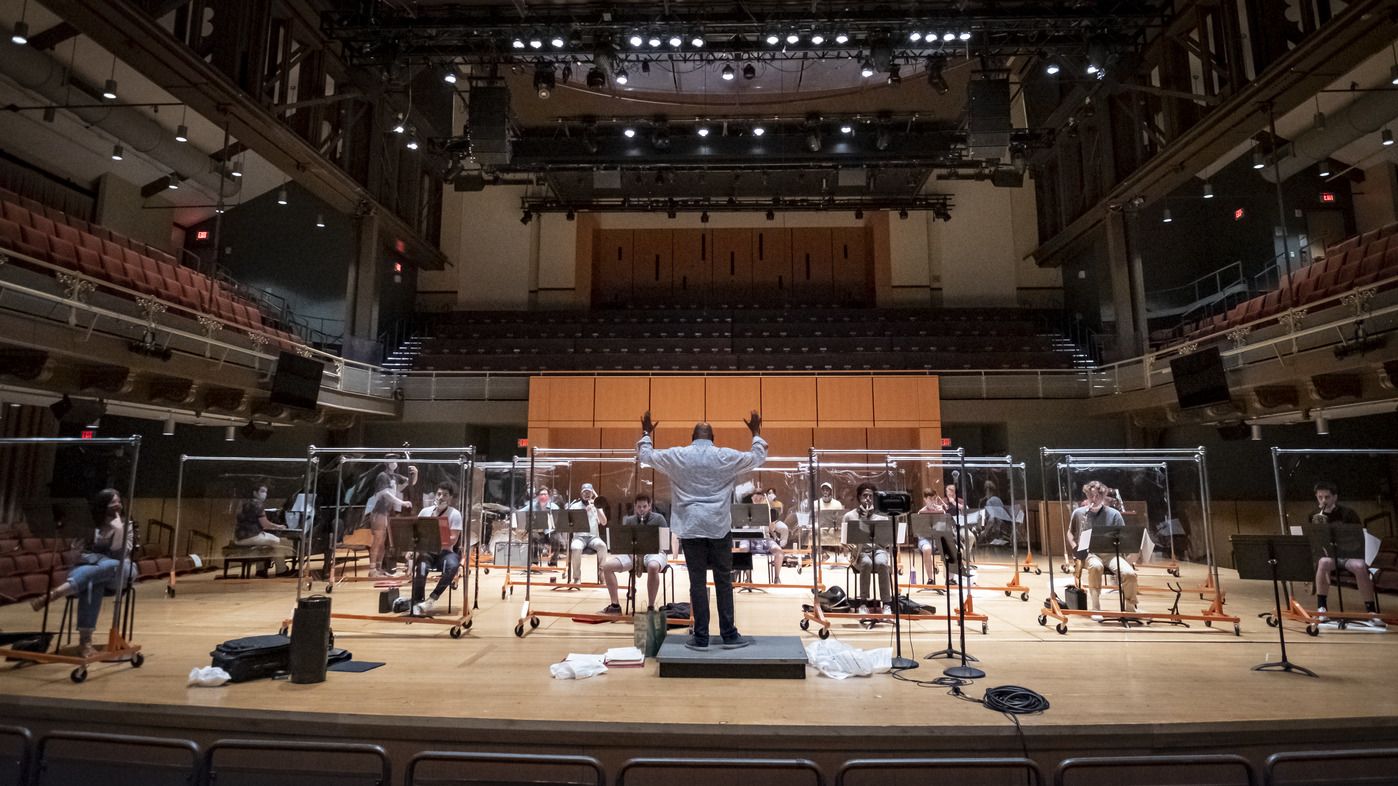The Temple University Jazz Band celebrates the legacy of Jimmy Heath
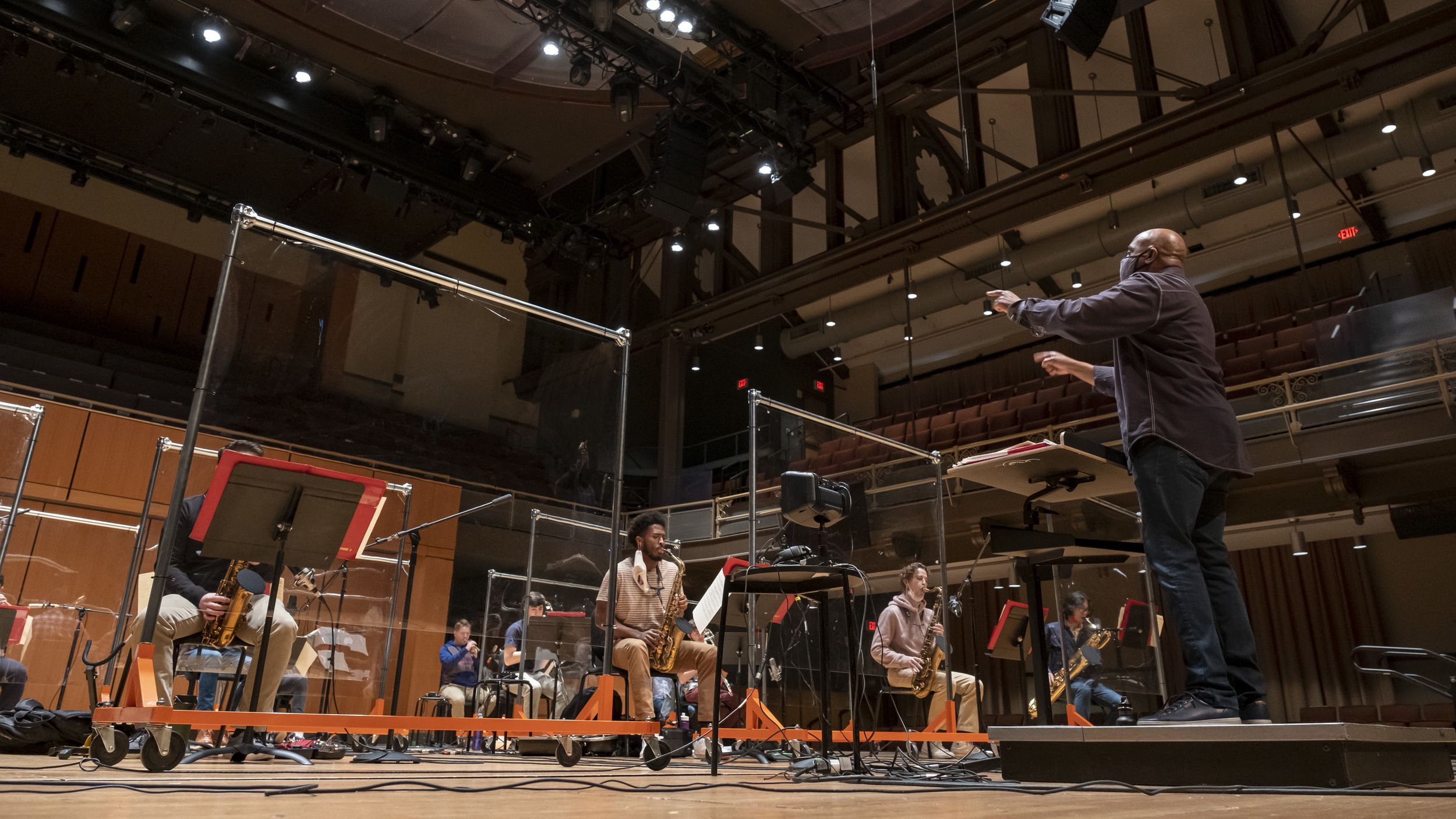
Some of the most important advice Terell Stafford, chair of instrumental studies at Boyer College of Music and Dance and director of the Temple University Jazz Band, ever received was from his mentor, colleague and friend, the jazz saxophonist and composer Jimmy Heath.
“He said, ‘The only thing you have to do is teach who you are. Teach your strengths and warn the students of your weaknesses. If you do that, you’ll always teach with honesty and honesty is the greatest way to teach,’” Stafford said.
Their decades-long friendship is at the heart of the band’s new album Without You, No Me, a tribute to Heath and other luminaries who have left an indelible mark on jazz and the city of Philadelphia.
The album began as a way of celebrating Heath, who died in January 2020. Stafford received the news the same night the Temple University Jazz Band, which Heath had supported and performed with, won the Jack Rudin Jazz Championship at Jazz at Lincoln Center. The next day Stafford called Boyer’s dean, Robert T. Stroker, and suggested the band record an album in honor of Heath. Stroker agreed and Stafford got to work.
Then the COVID-19 pandemic sent Philadelphia into lockdown. “The Music Department could [only] come together on a limited basis. We had some folks who had free time because they weren’t traveling and performing. And they wrote some music, some commissions [for the album],” Stafford said.
He invited renowned bassist Christian McBride and organist Joey DeFrancesco to collaborate on the album and began assembling music, starting with the title track, “Without You, No Me,” a piece Heath had composed for his own mentor, Dizzy Gillespie. A symbol of one great musician’s admiration for another, the tune was also a reminder of how Stafford and Heath first met, playing in the Dizzy Gillespie All-star Alumni Band.
Later, when Heath’s band was about to go on tour in Europe, he invited Stafford along. “We would talk all the time about life and how you treat others. He talked about his past and how he would have done things differently. And moving forward how I could do things,” Stafford said.
And when Stafford got a teaching position at Temple 25 years ago, Heath was one of the first people he called for advice. The veteran musician told him he should be completely authentic with his students, teaching them what he excelled at and being candid about what he still had to learn. That’s precisely what Stafford did. “For the most part, students appreciate knowing that you’re working on something,” he said.
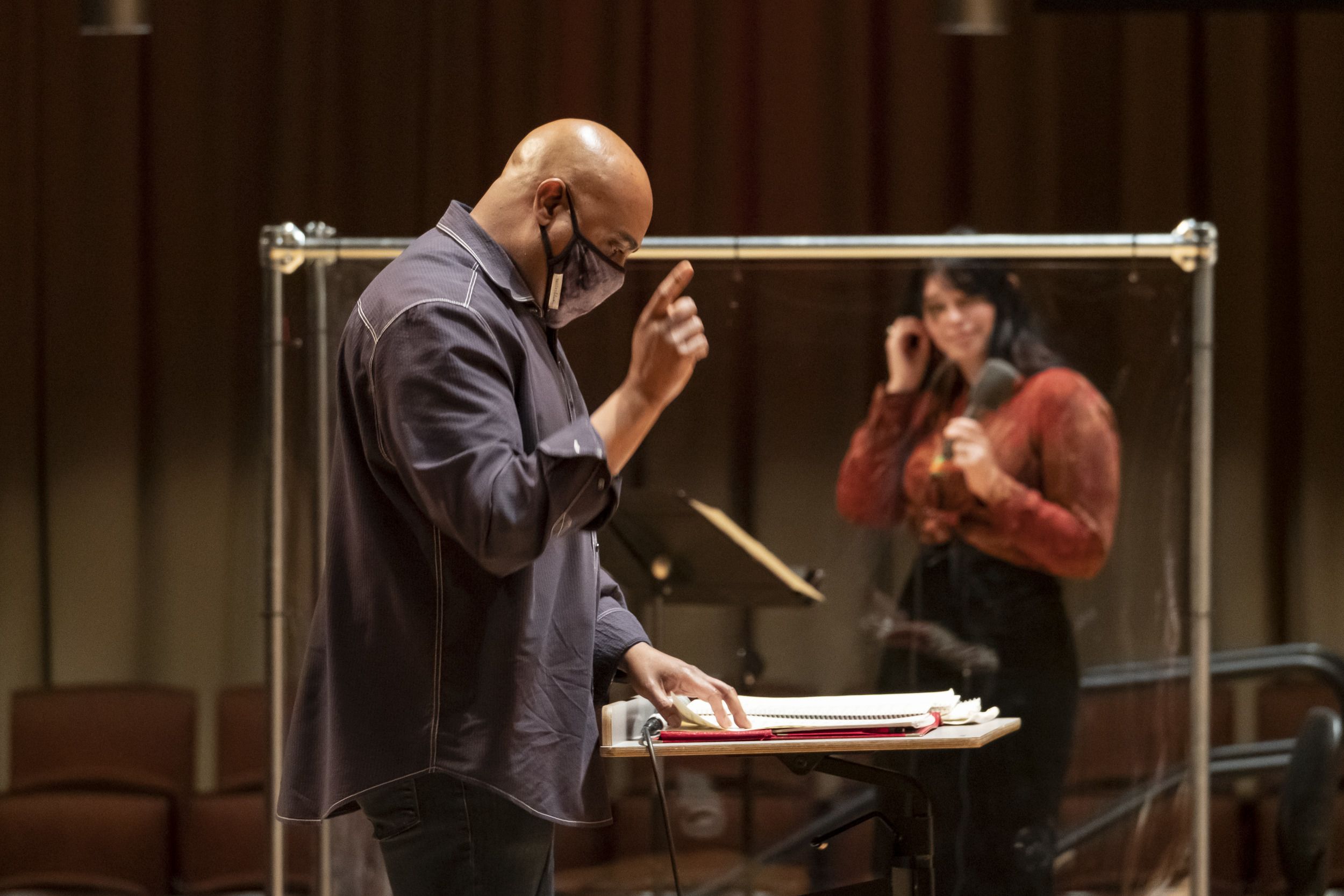
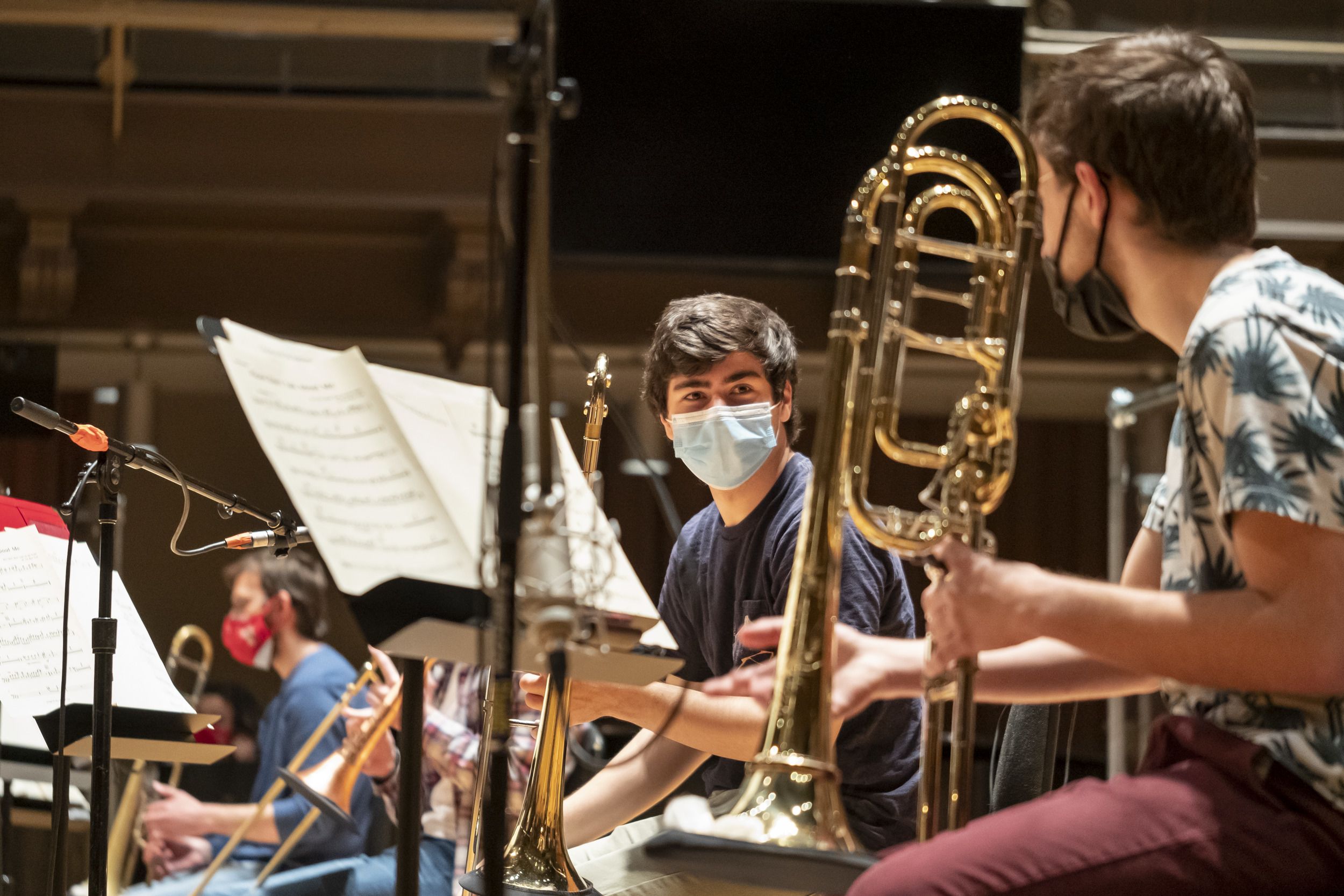
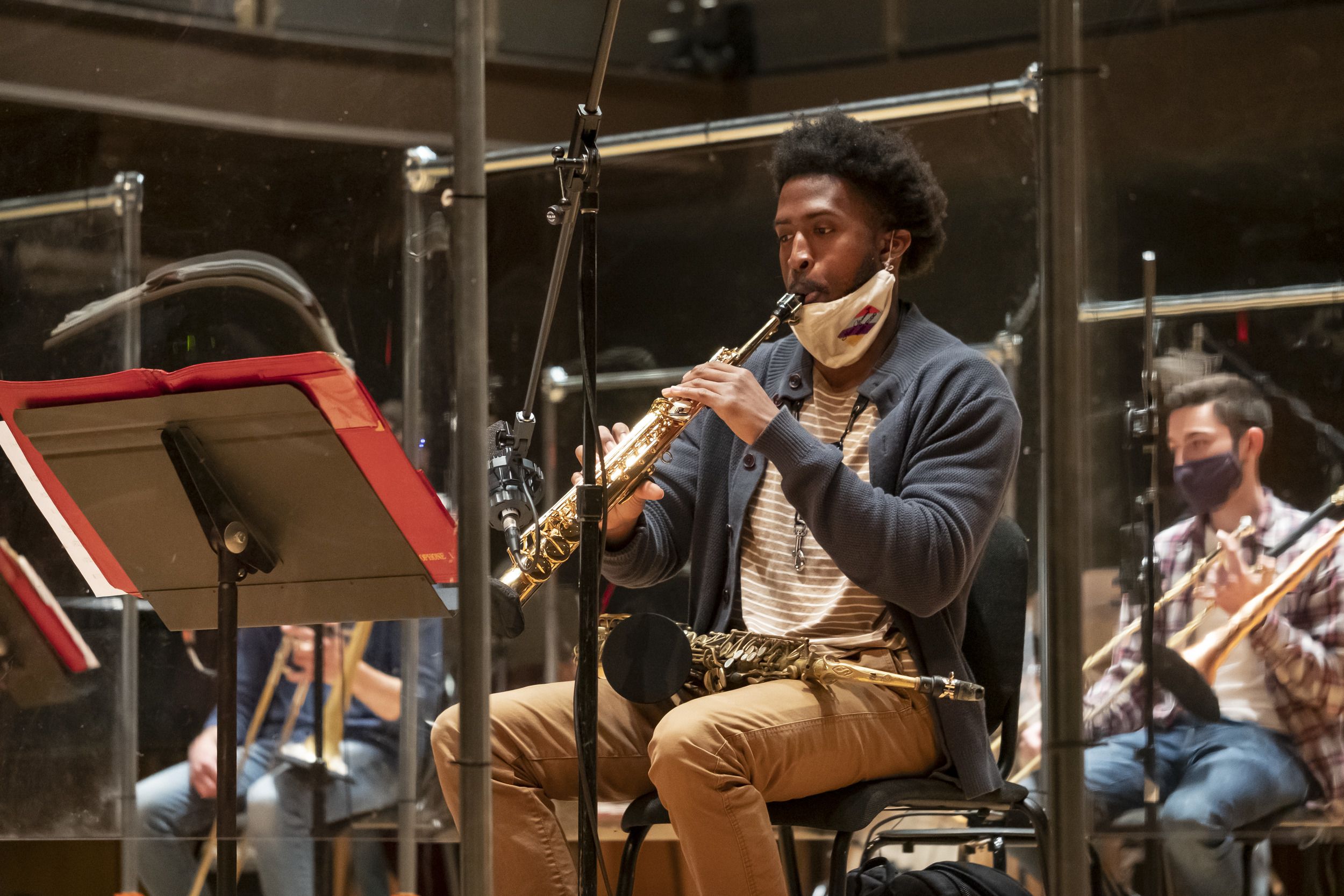
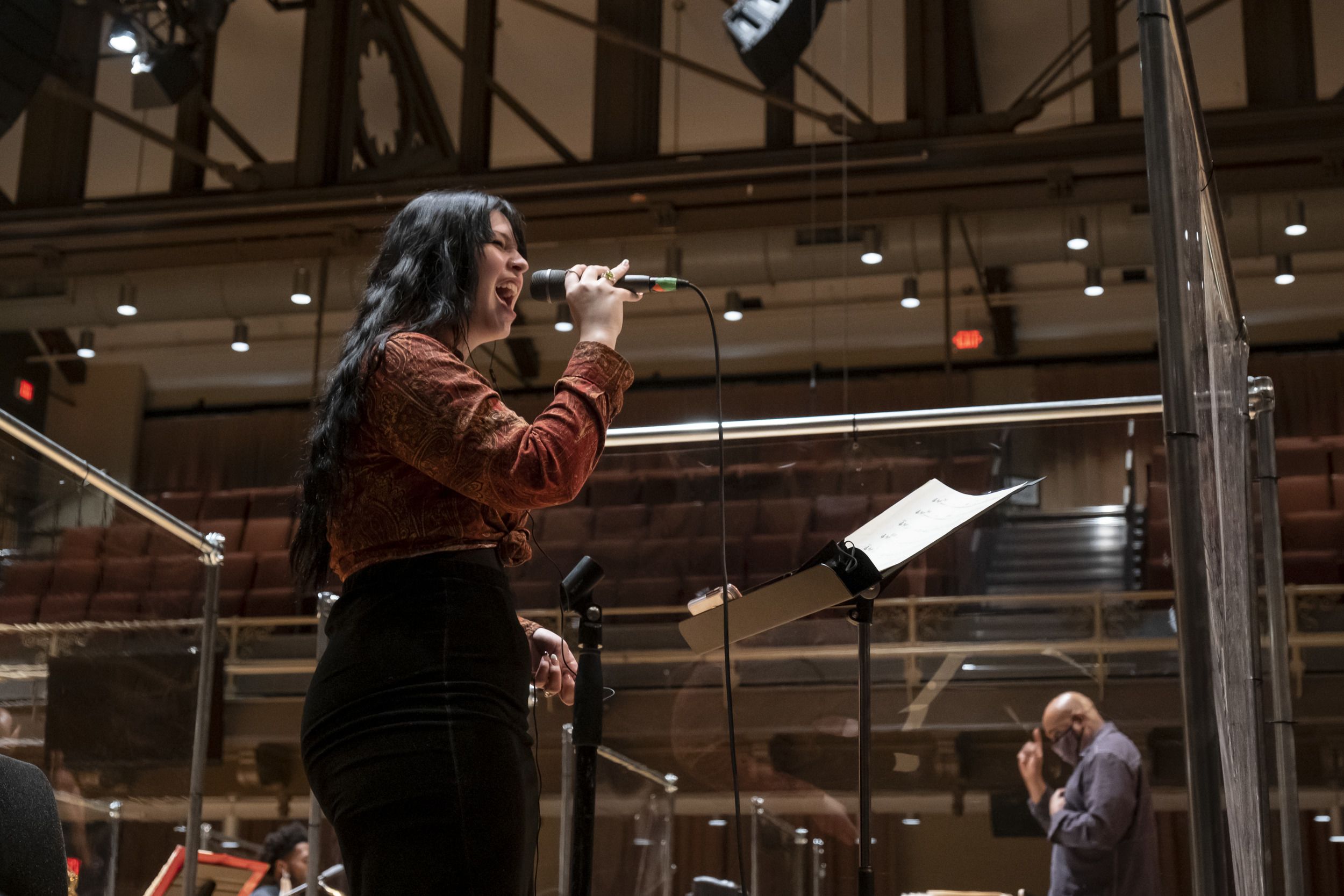
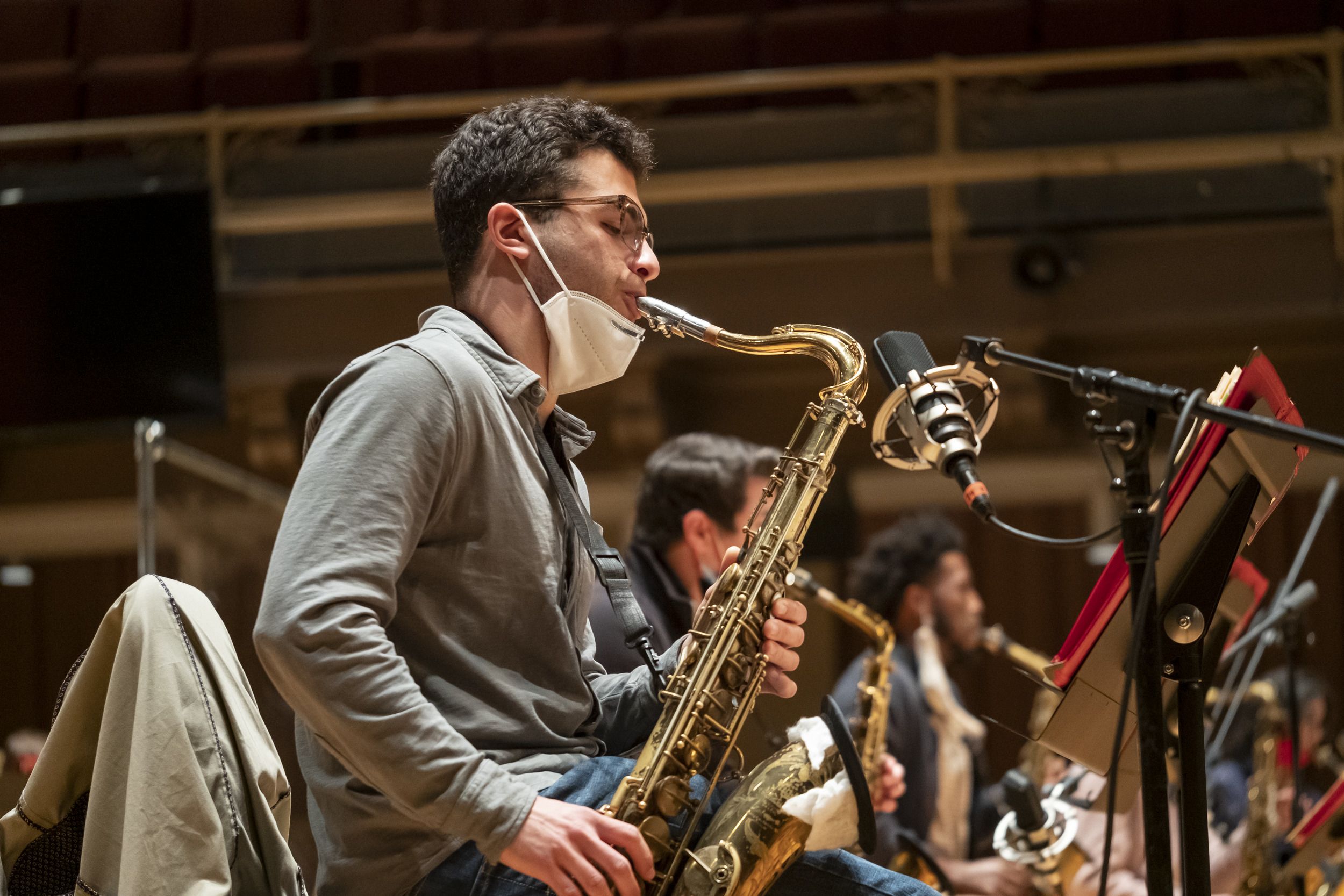

Terell Stafford directs the Temple University Jazz Band.
Terell Stafford directs the Temple University Jazz Band.




Throughout the years, Stafford and Heath remained close. “He was just a great human being, all the way around,” Stafford said.
Losing him was a blow, as was the passing of two other Philadelphia greats: John Chaney, the influential former men’s basketball coach at Temple and Bootsie Barnes, the legendary saxophonist and mainstay of the city’s jazz scene, who died of complications caused by COVID-19. Without You, No Me expanded to become a tribute to them as well.
Both men meant a great deal to Christian McBride. “I can’t think of too many people who meant more to Temple and to the city of Philadelphia than John Chaney. When I was growing up in Philadelphia, he was a towering figure, a very important person in our culture,” he said.
McBride composed “The Wise Old Owl” for the album in Chaney’s honor, inspired by Temple’s mascot and by the guidance Chaney gave dozens of students. “Not only did he really train these young athletes to be great basketball players, he trained them to be great people. And I think that’s what great coaches do. They can see beyond the court, because they understand that your career as an athlete is going to be much shorter than your total life. He always chose to raise these athletes to be great human beings,” he said.
For McBride, Barnes was to jazz what Chaney was to basketball. “Anybody who wanted to be a jazz musician who lived in Philly, you had to come through Bootsie Barnes. He was one of the greatest mentors of so many in Philly,” he said. “Most musicians who are from Philly, and have an opportunity to have a bigger career, leave Philadelphia. Jimmy Heath left Philadelphia. I left Philadelphia. Joey DeFrancesco left Philadelphia. Questlove left Philadelphia. But Bootsie Barnes never left. He always stayed. And for that alone, we loved him.”
In keeping with Without You, No Me’s themes of tribute and remembrance, saxophonist Jack Saint Clair, BYR ’16, wrote “Bootsie” in memory of Barnes and an arrangement of organist Shirley Scott’s “The Blues Ain’t Nothin’ (But Some Pain),” while Todd Bashore, a saxophonist and former student of Heath’s, wrote the album’s opening track, “Passing of the Torch,” in honor of him.
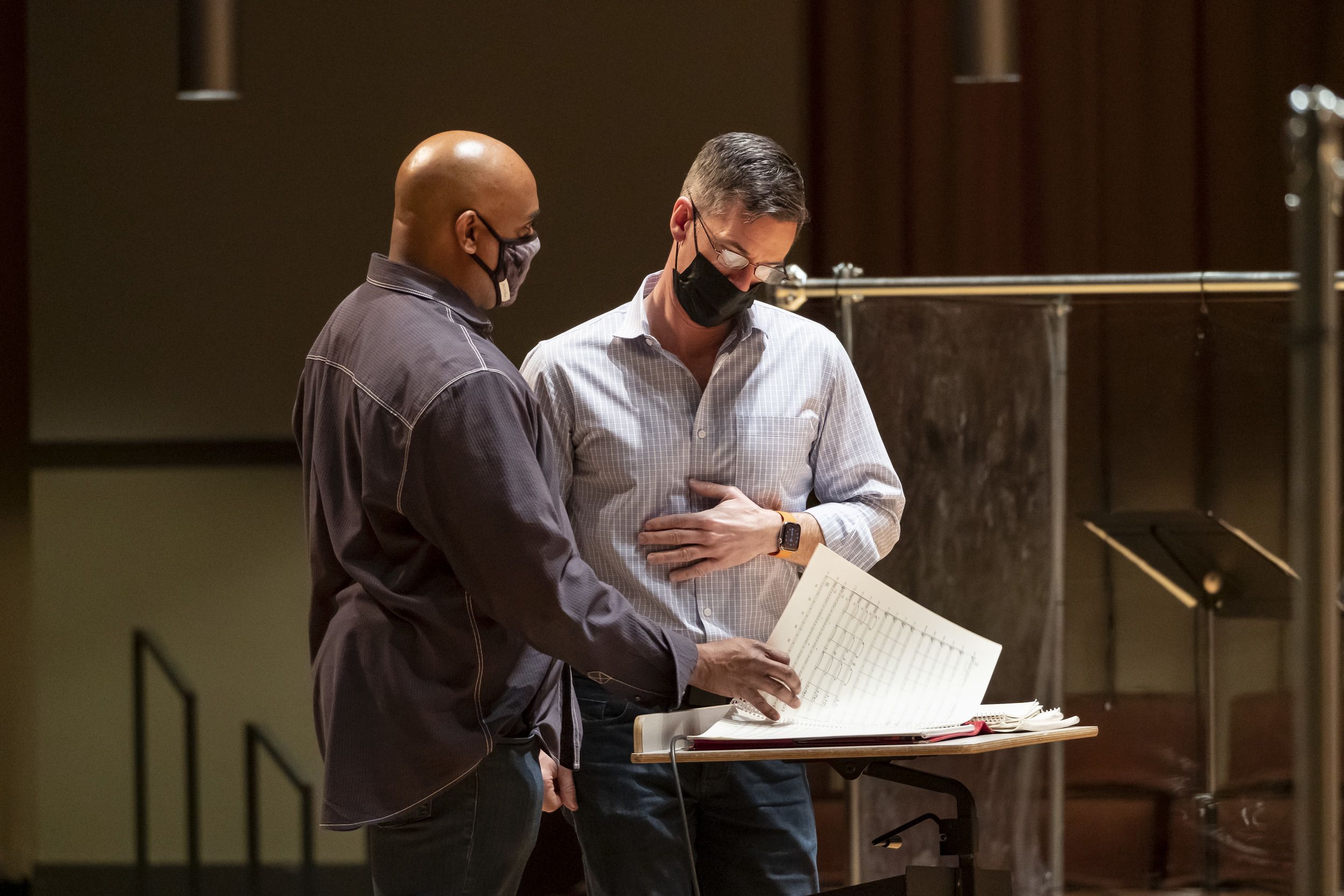
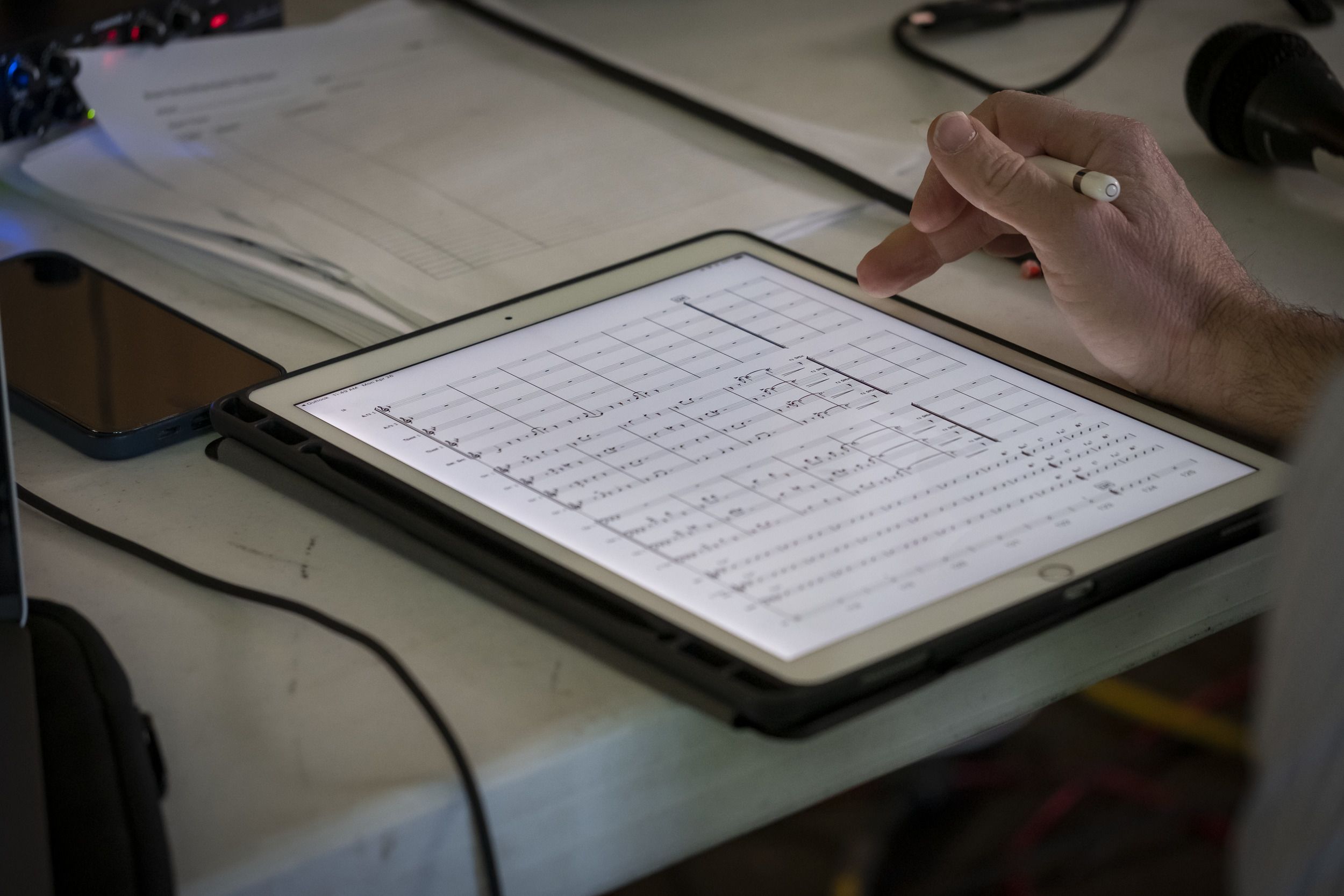
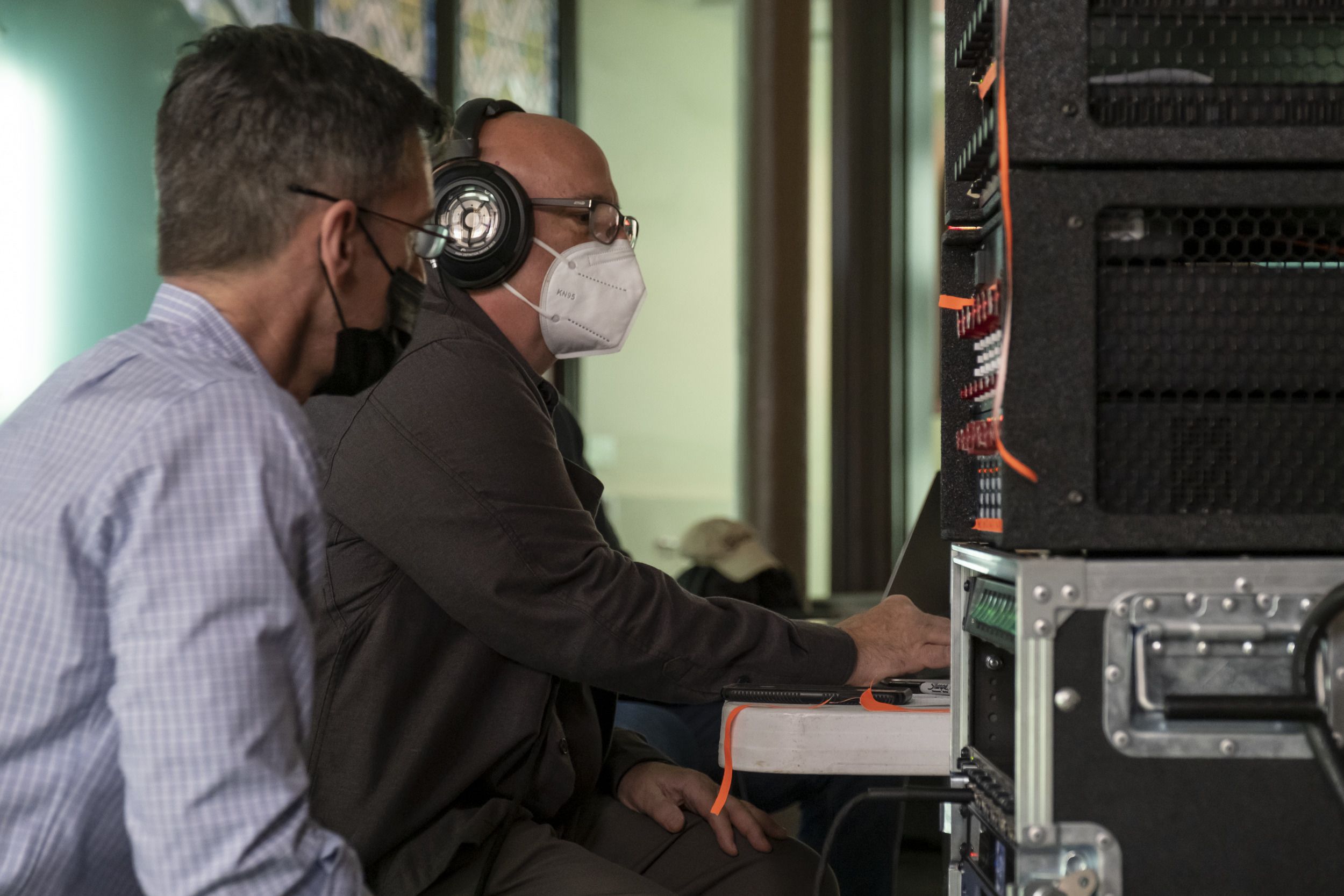
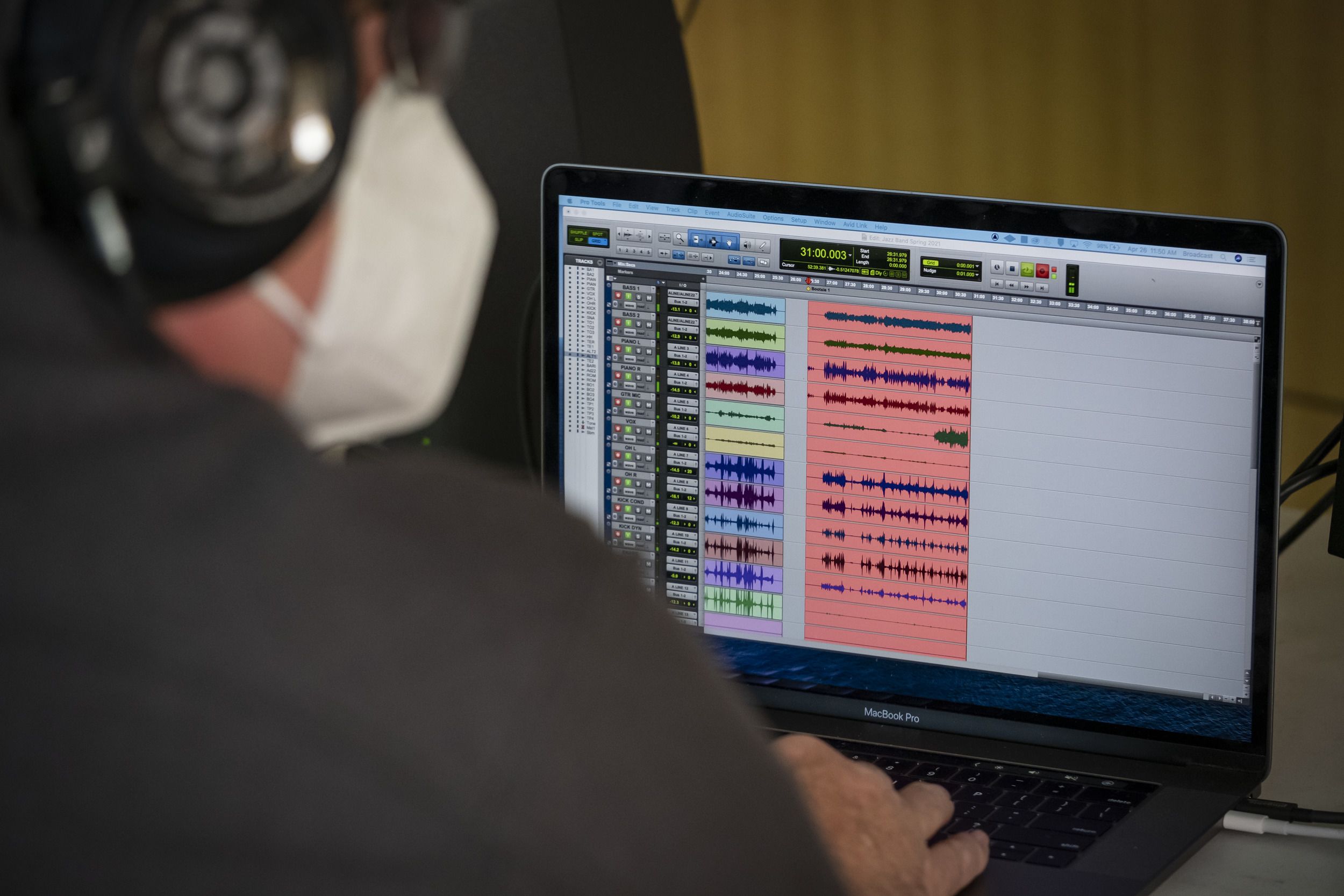
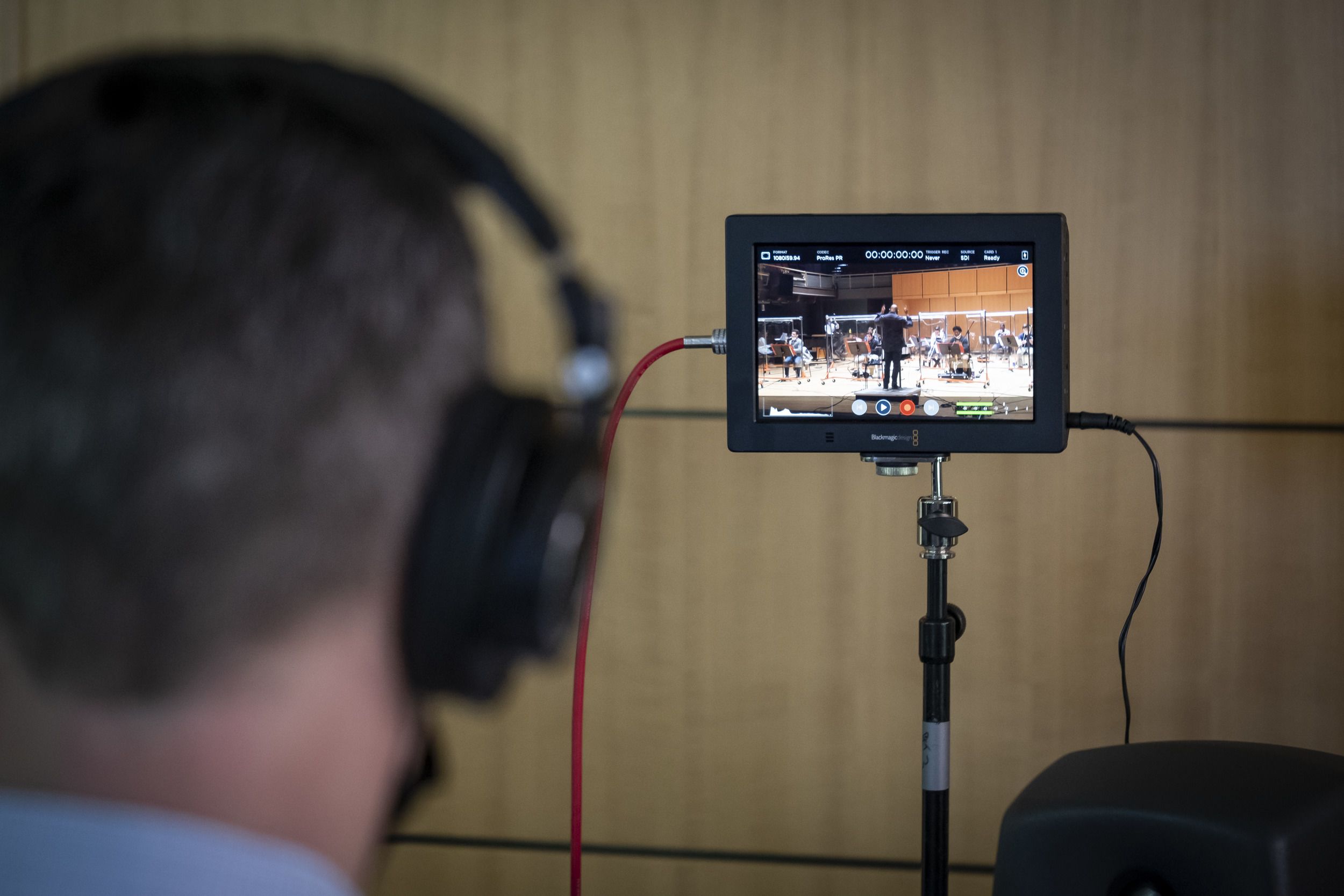
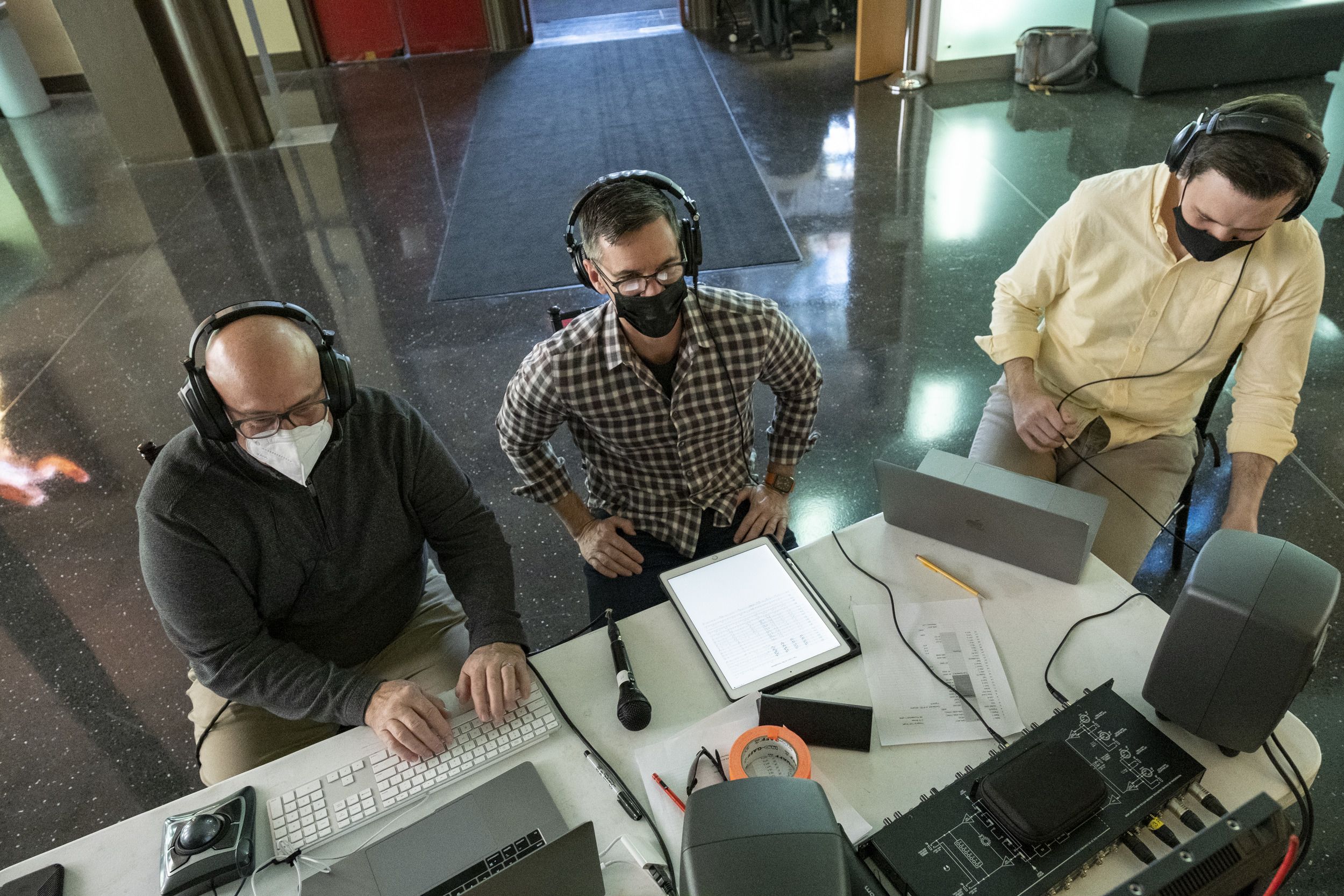
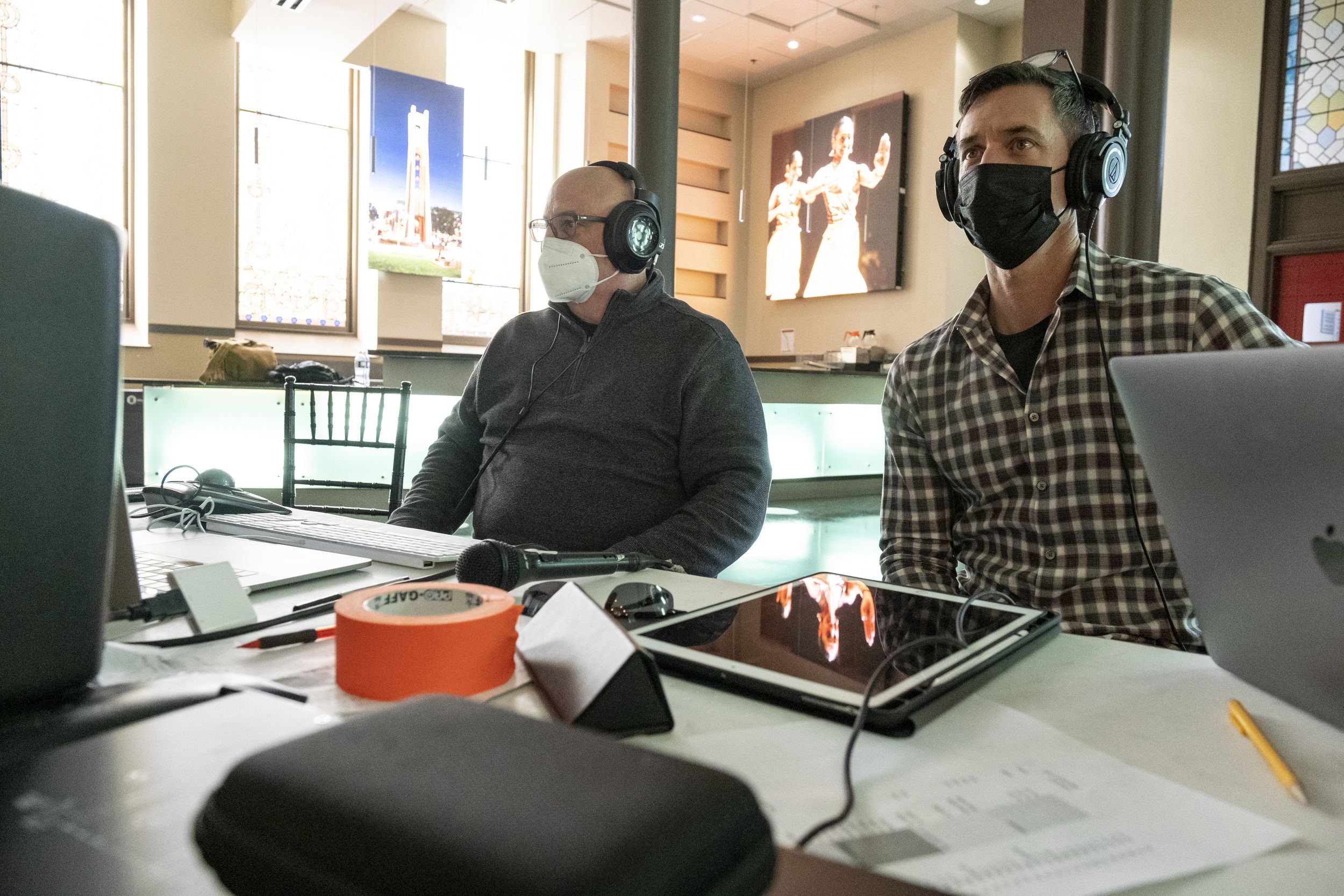

Terell Stafford in conversation with David Pasbrig, sound engineer, producer and associate professor of music studies.
Terell Stafford in conversation with David Pasbrig, sound engineer, producer and associate professor of music studies.






John Harris, adjunct faculty member in the music technology program and David Pasbrig, associate professor of music studies
John Harris, adjunct faculty member in the music technology program and David Pasbrig, associate professor of music studies
In some ways, recording the album was even more challenging than the process for the band’s previous release, Covid Sessions: A Social Call, which was recorded remotely. The band recorded in person, on stage at the Temple Performing Arts Center over the course of two days. The students sat six feet apart, separated by Plexiglas barriers; McBride and DeFrancesco recorded their parts separately.
“With COVID-19, everything had to be really streamlined and efficient,” said saxophonist Dylan Band, Class of 2022. “We had to keep taking breaks and letting the room air out.”
Concentration was key. For Covid Sessions, the students recorded their parts separately, largely from the comfort of their own homes. If they made a mistake, they could simply stop and start again. But if someone made a mistake during a session for Without You, No Me, the entire band had to start over.
Despite the challenges, Band loved working on the album. “This one was a little more enjoyable for me. I loved doing Covid Sessions too, but at least this time we all got to play together. And it’s so much different when you’re in the same room with each other,” he said.
Without You, No Me is the third of the band’s recordings he’s participated in. “We’re extremely lucky to be able to record on such a regular basis,” Band said. “That’s just a testament to Terell and the dean for supporting us and getting us to that level where we’re able to record.”
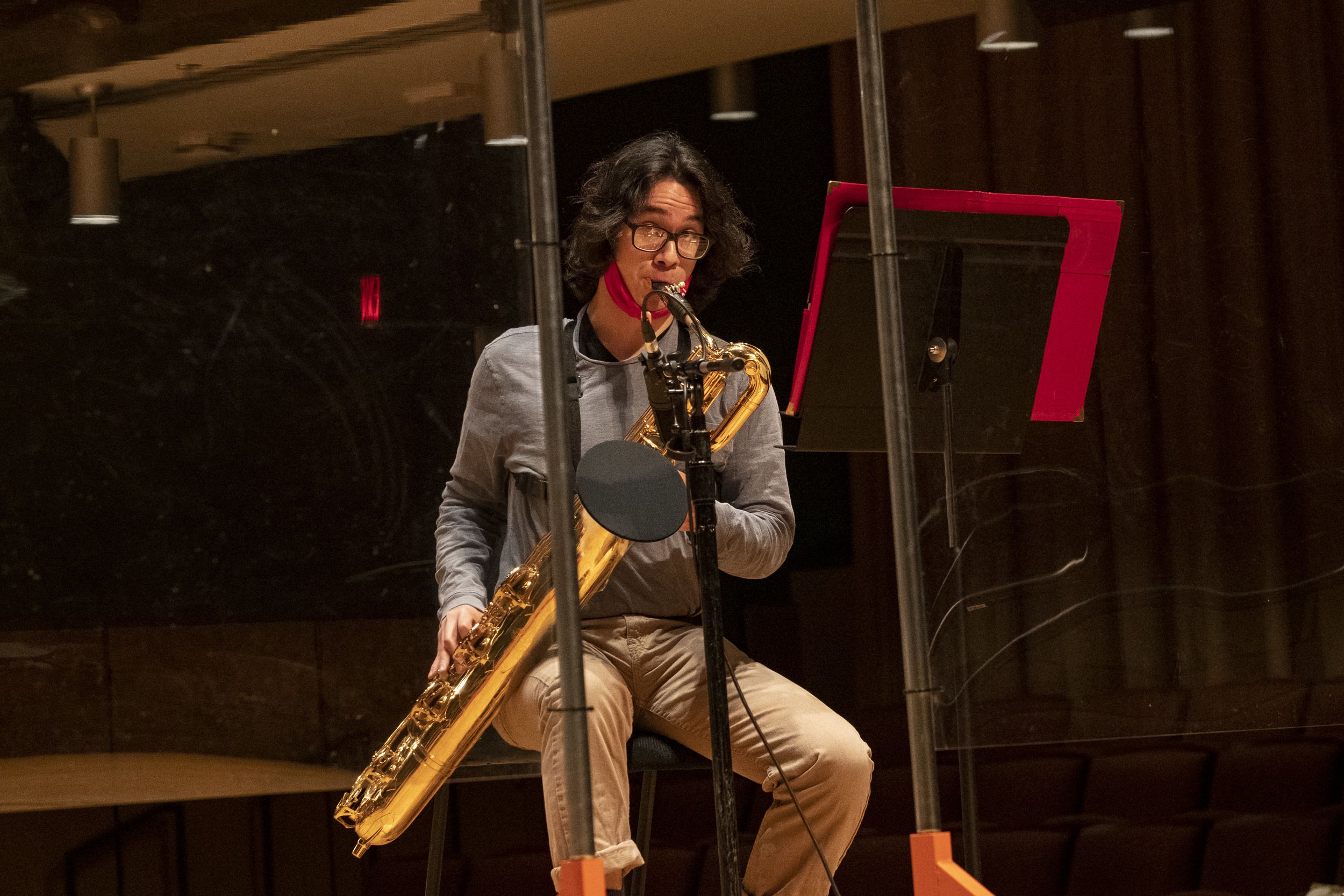
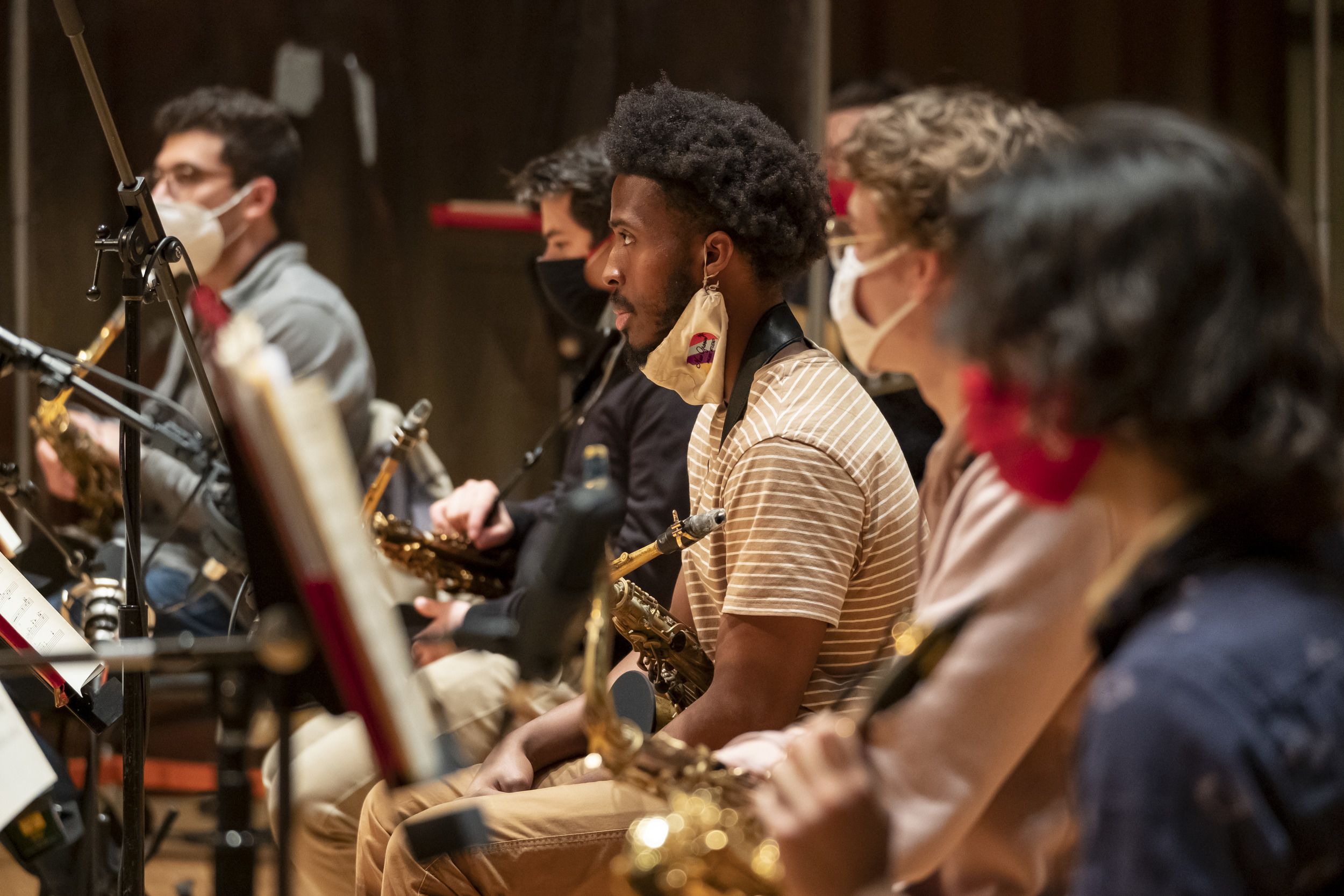
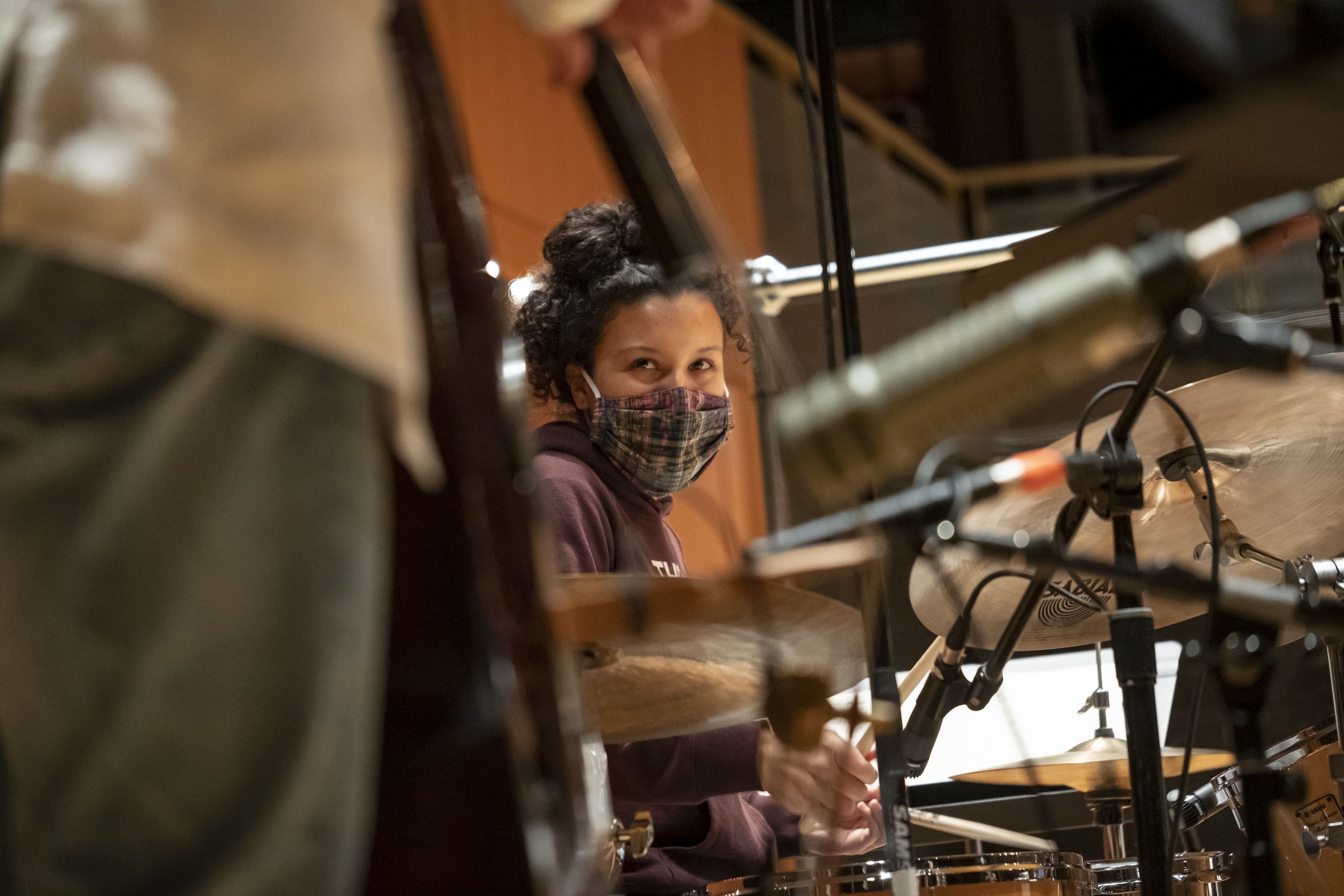
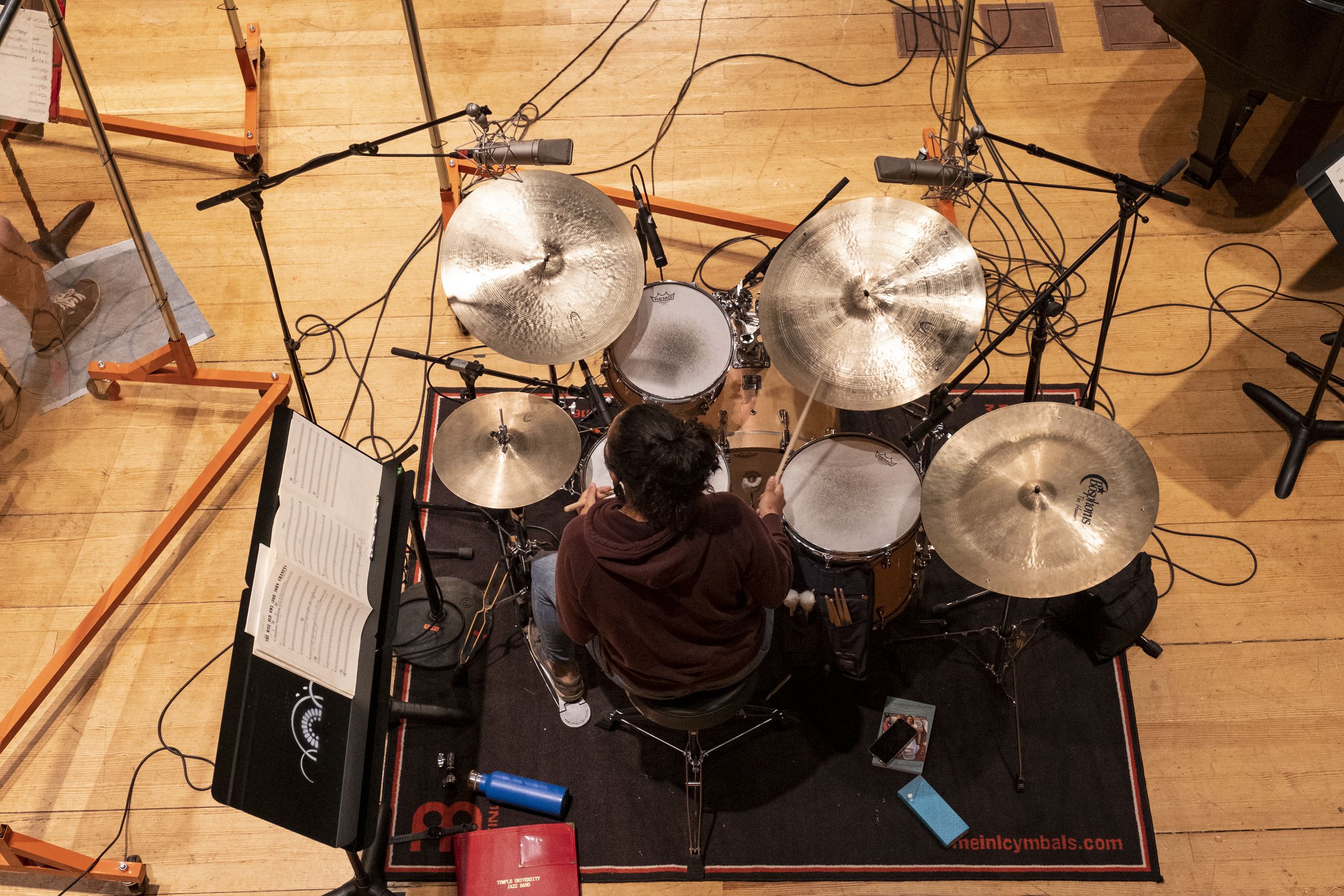
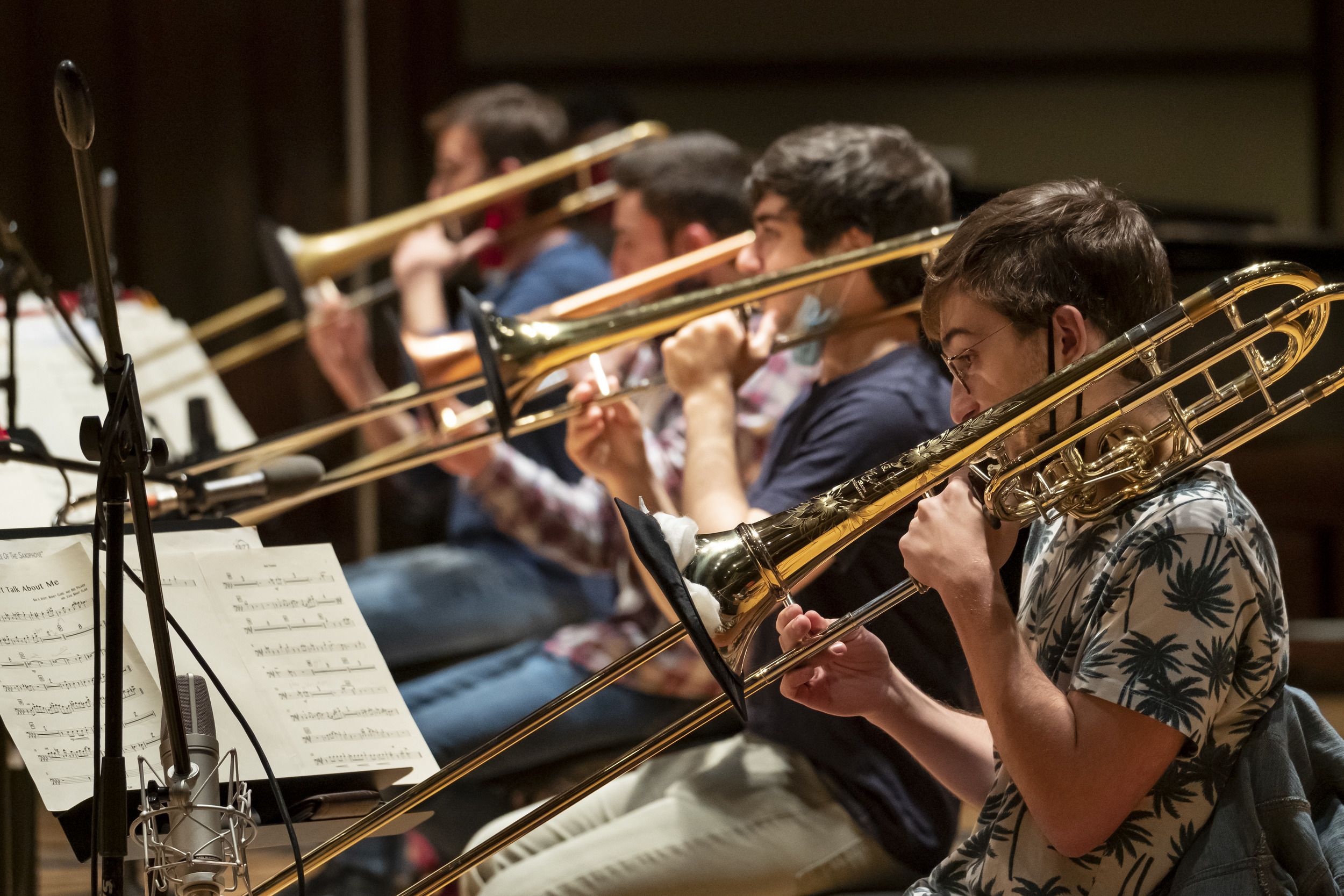
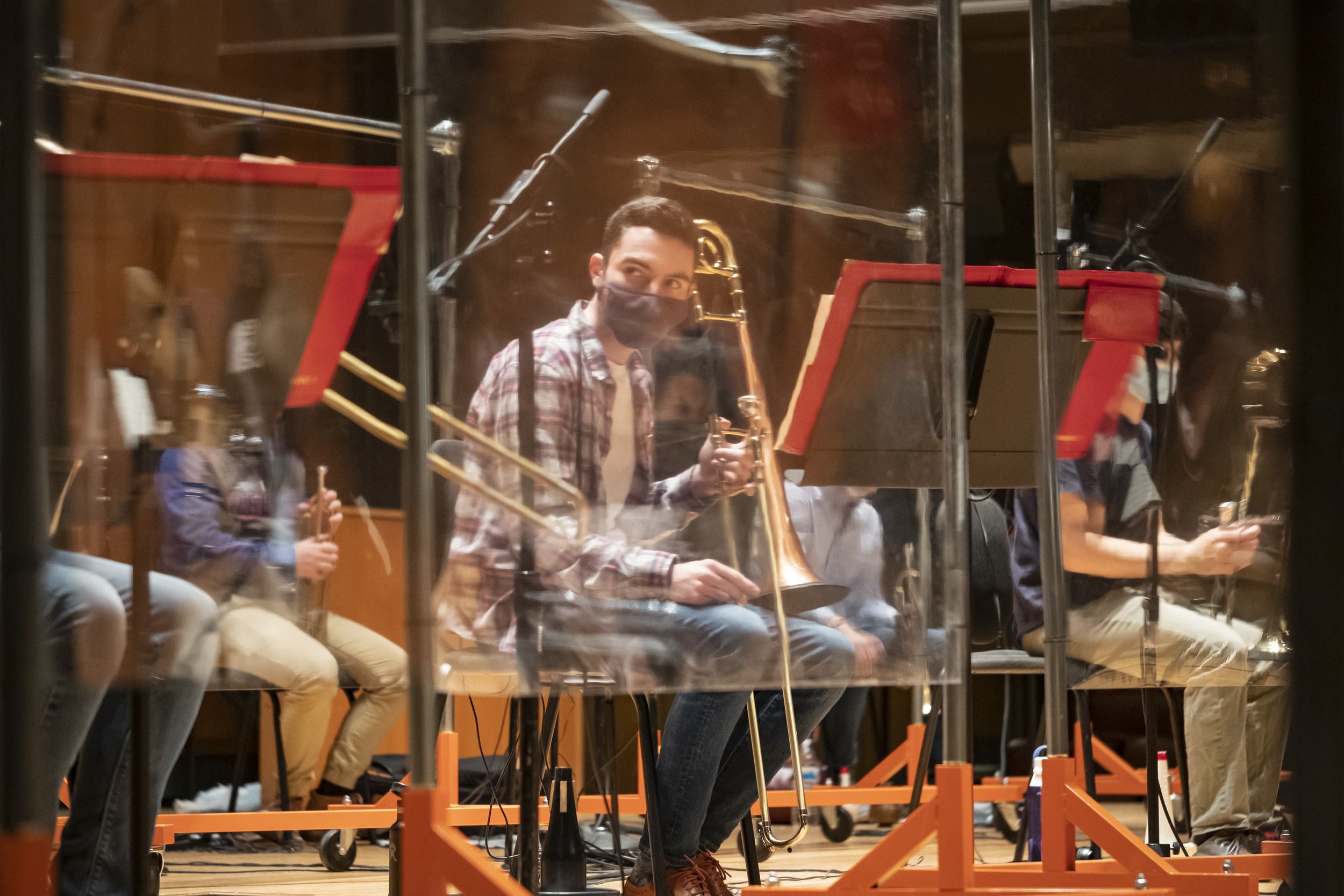






Stafford’s favorite track on the album is saxophonist Larry McKenna’s arrangement of “Perdido,” an exuberant piece that’s traditionally used as an opportunity to invite guest musicians to sit in and play with a band. “It’s about community [and] people coming together. There’s joy in the music and honesty,” he said.
Drummer Maria Marmarou, Class of 2022, is fond of it as well. “Everyone gets to solo on that, all the guest artists. And it felt really good when we were playing it,” she said.
Playing with the band has helped her grow as a musician. “This will be my third year playing in the band and I've learned so much about music. Being a drummer in a big band is a huge responsibility. You’ve got to fill shoes that were there before you,” she said. A drummer helps make or break a band and Marmarou has worked hard to be a leader in the rhythm section. “You have to be selfless. It’s all about making everyone sound good,” she said.
The most important thing Band has learned is a sense of community. “While we’re rehearsing and playing, and even when we’re not, you’re building connections with people. You’re establishing these relationships that become way more important than the notes on the page or even how the concert might sound,” he said. “You’re building this family. And through that process, the music only gets better.”
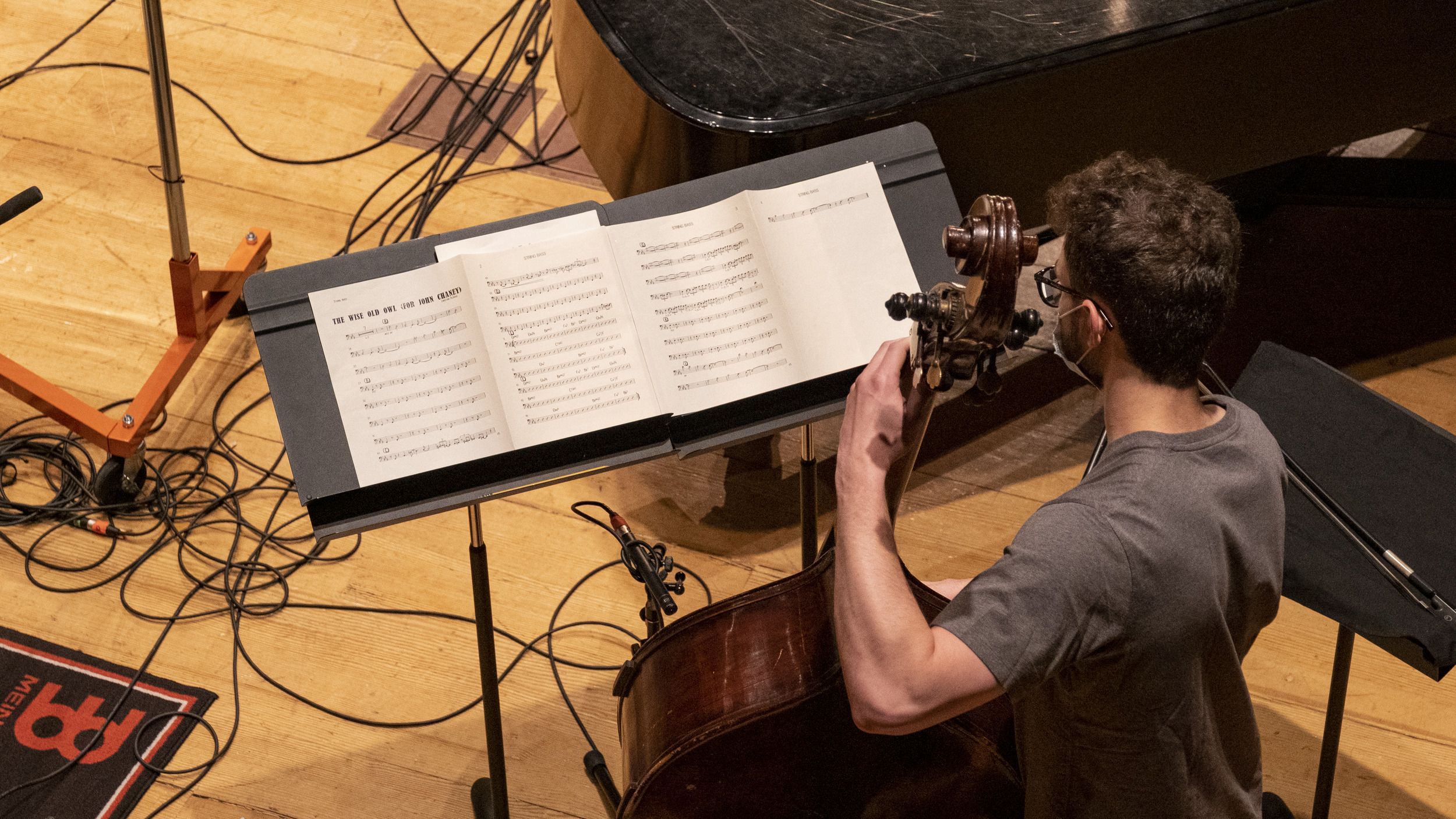
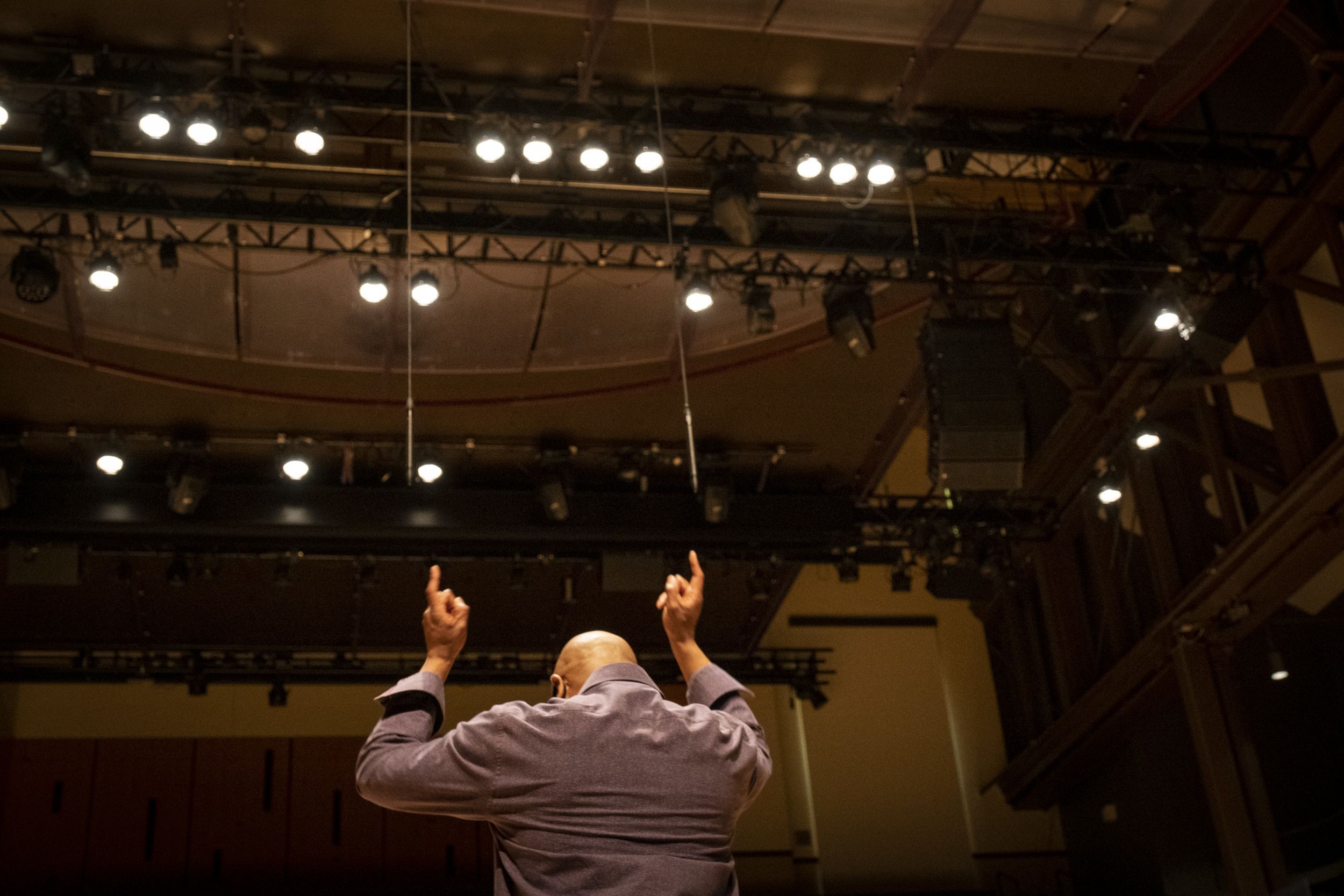
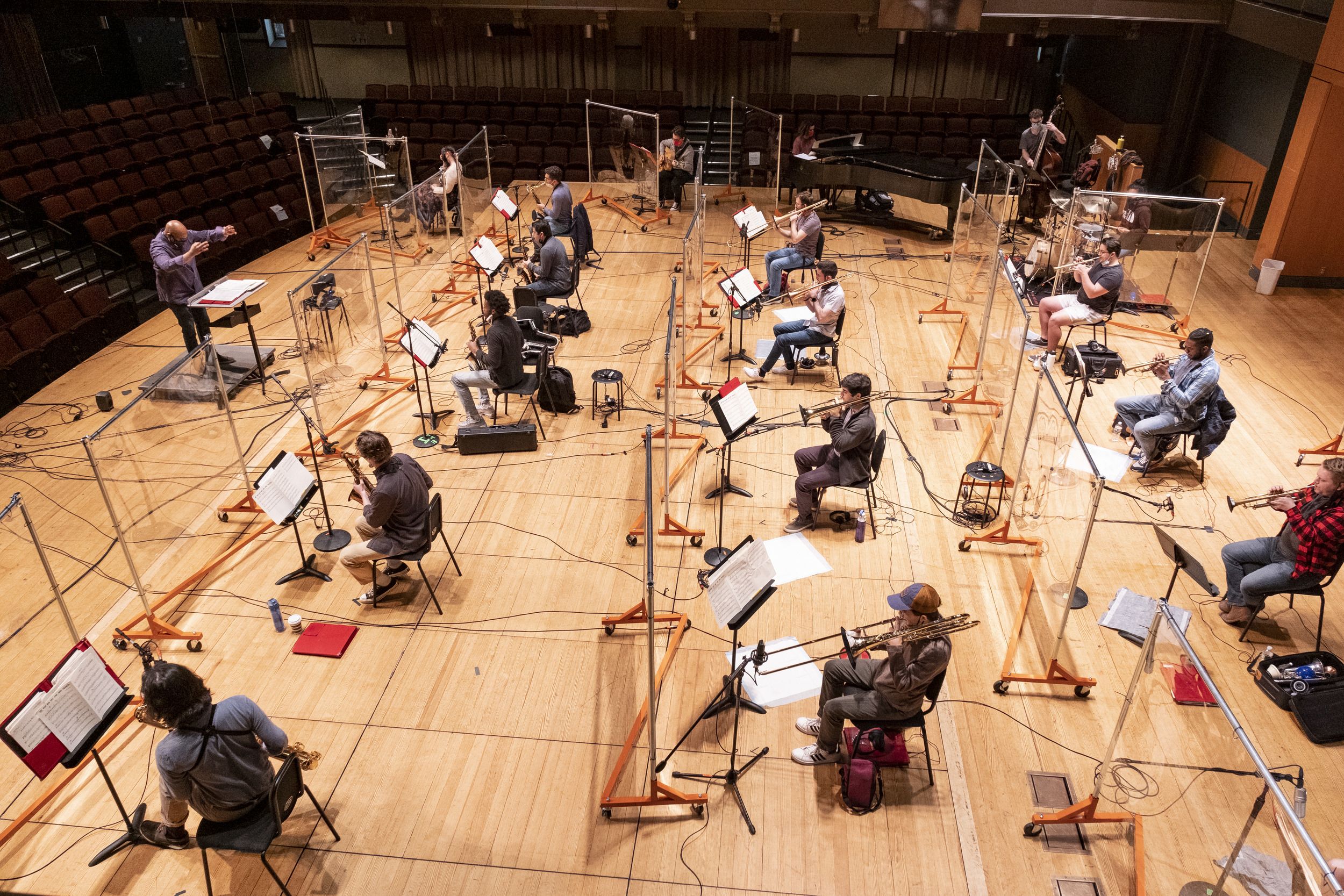



McBride hopes the album will encourage listeners to appreciate what jazz means to generations of musicians. “I hope they can realize just how important this art form is to young people and how much support that not only the younger people, but the people who are the mentors, the musicians who are out there playing, need. The arts are an emotional necessity for our lives. I feel like a lot of people lost their compass and I understand how hard it was because we have lost so many people during this pandemic. But one of the things that really maintains sanity is music,” he said.
“When you hear these young people that Terell’s trying to teach the basics of human interaction through jazz, I hope people will listen to this recording and really understand just how important this music is to our daily lives and [how crucial it is] to support the young people and their mentors who believe in it,” McBride said.
Stafford hopes audiences will treasure what Philadelphia has contributed to jazz as an art form. “There was so much love given by Christian and Joey. And all the students, the dean and the recording engineer, who put hours and hours into mixing [the album]. I’m hoping people appreciate the artistry of the masters like Jimmy Heath, Shirley Scott, Bootsie Barnes and Larry McKenna,” he said. “I hope they just feel how swinging and heartfelt everything is.”
Without You, No Me is available to stream and download now.

